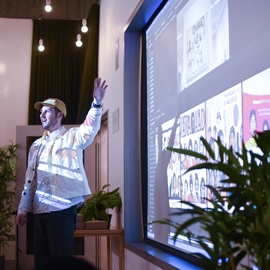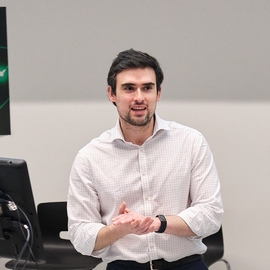Abstract
Additive manufacturing has enabled the fabrication of advanced reactor geometries, permitting larger, more complex design spaces. Identifying promising configurations within such spaces presents a significant challenge for current approaches. Furthermore, existing parameterisations of reactor geometries are low-dimensional with expensive optimisation limiting more complex solutions. To address this challenge, we establish a machine learning-assisted approach for the design of the next-generation of chemical reactors, combining the application of high-dimensional parameterisations, computational fluid dynamics, and multi-fidelity Bayesian optimisation. We associate the development of mixing-enhancing vortical flow structures in novel coiled reactors with performance, and use our approach to identify key characteristics of optimal designs. By appealing to fluid mechanical principles, we rationalise the selection of novel design features that lead to experimental performance improvements of ~60% over conventional designs. Our results demonstrate that coupling advanced manufacturing techniques with `augmented-intelligence’ approaches can lead to superior design performance and, consequently, emissions-reduction and sustainability.

Forward Deployed Engineer at Palantir, former PhD student at OptiML (2021-2025)
I am a PhD student at Imperial College London & 2023 Enrichment student at the Alan Turing Institute. I have a background in Chemical Engineering and still enjoy teaching labs at Imperial College. Alongside my work in process systems engineering, I am affiliated with Winchester School of Art producing installations with the Tate on the intersection between AI and art. My interests include Bayesian optimisation, human-in-the-loop machine learning, cricket 🏏, and darts 🎯.

Principal Investigator of OptiML
Antonio del Rio Chanona is the head of the Optimisation and Machine Learning for Process Systems Engineering group based in thee Department of Chemical Engineering, as well as the Centre for Process Systems Engineering at Imperial College London. His work is at the forefront of integrating advanced computer algorithms from optimization, machine learning, and reinforcement learning into engineering systems, with a particular focus on bioprocess control, optimization, and scale-up. Dr. del Rio Chanona earned his PhD from the Department of Chemical Engineering and Biotechnology at the University of Cambridge, where his outstanding research earned him the prestigious Danckwerts-Pergamon award for the best PhD dissertation of 2017. He completed his undergraduate studies at the National Autonomous University of Mexico (UNAM), which laid the foundation for his expertise in engineering.